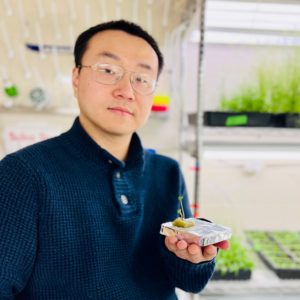
Dr. Yongjian Qiu wins prestigious NSF Career Award
Dr. Yongjian Qiu will use the $1 million award to aid in discovering gene expression mechanisms in plant thermomorphogenesis. The National Science Foundation Career Awards are highly prestigious and only offered to faculty members who demonstrate the potential to serve as teacher-scholar role models in research and education.
ABSTRACT
![]()
In the context of global climate change, plants face a more fluctuating temperature environment. It is well known that extreme temperatures such as heatwaves have detrimental impacts on crop production and biodiversity. However, even smaller increases in ambient temperatures would dramatically change the growth and development of various plant species. These thermo-induced changes in the growth speed of organs (e.g., stem and roots), biomass, flowering time, the rate of photosynthesis, and the efficiency of water usage, significant impact crop yield and fitness. However, the precise mechanisms by which plants sense and respond to moderately increased, nonstressful (warm) temperatures are still unclear. The long-term goal of the proposed project is to elucidate the regulatory mechanisms by which warm temperatures trigger the expression of critical genes whose products contribute to the morphological and architectural changes in land plants. To achieve this goal, innovative technologies have been developed or adapted to examine the spatiotemporal functions and structure-function relationships of critical transcriptional regulators and their co-factors in thermosensory growth. Understanding these mechanisms is crucial for us to design and breed climate-resilient crops, potentially reducing the adverse effects of global warming on crop productivity and food security. The success of the project will also help train next-generation scientists from high school to graduate levels in performing cutting-edge research.
Different from the stress responses triggered by extreme temperatures, plant responses to nonstressful ambient temperature fluctuations require unique machinery. Among the discovered components, thermosensory transcription factors (TTFs) play primary roles in warm-temperature-induced hypocotyl (embryonic stem) growth, a process termed thermomorphogenesis. Among the identified TTF families, PIF4 plays a pivotal role in modulating thermomorphogenetic growth. Warm temperatures activate PIF4 transcription through a yet unknown mechanism, and accumulated PIF4 promotes hypocotyl growth by activating key genes involved in the biosynthesis of and response to the growth hormone auxin. The PI discovered HEMERA (HMR) as a coactivator of PIF4 in activating the thermoresponsive gene expression. Although HMR is required for PIF4 activity and protein stability at warm temperatures, how these regulations are achieved remains elusive. Through forward and reverse genetic approaches and bioinformatic analyses, the PI’s group has identified multiple factors that may regulate PIF4 expression, activity, and protein stability upon temperature elevations. The proposed research will uncover PIF4-mediated thermomorphogenetic mechanisms and transcriptional regulatory networks formed by PIF4 and other TTF families. The integrated educational plan will improve STEM preparedness at the University of Mississippi and across the state of Mississippi and includes efforts to 1) enhance undergraduate and graduate education in plant molecular genetics and physiology at UM; 2) develop a plant phenomics and molecular genetics summer research program for underrepresented minority students at UM and HBCUs; 3) develop a plant molecular biology summer research program for high school and community college students with disadvantaged backgrounds.
